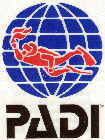
everything on holidays
and travel with kids

|

|

|

|
|
|

|
Diving Holidays
 Practical Pointers
Practical Pointers Health Issues
Health Issues Learning
Learning Diving for Children
Diving for Children Insurance
Insurance The Environment
The Environment Diving Operators
Diving Operators
 Activity Holidays
Activity Holidays Diving Holidays
Diving Holidays Learning
Learning Whatever course you do you should cover health and safety, dealing with pressure, buoyancy, equipment, marine life, weather and water conditions, and the meanings of various hand signals.
Ideally you would select a qualification that has a CMAS rating (‘Confederation Mondial des Activites Subaquatiques'). For example a PADI Divemaster is equivalent to CMAS 5 Star, which is the same as a BSAC Advanced Diver qualification. With a CMAS equivalent qualification your skills should be accepted anywhere.
Basic open water diving courses are run in local swimming pools. This saves on sitting in a classroom when you could be out in the water on holiday. On the other hand, a swimming pool is not the most attractive place to be diving so some people decide to do the full course at the resort where it will also be a little cheaper (around £150 as opposed to £200 nearer home).
If you have already trained you will still be expected to take a check-out dive at most resorts.
In addition to training the following offer accreditation to diving centres. This is important as there have been cases of dive centres using old or damaged equipment and employing under-qualified instructors.
Both BSAC and PADI accredited centres offer one-off taster dives for beginners.
BSAC (British Sub Aqua Club) 
Telford's Quay, Ellesmere Port, Cheshire CH65 4FL
tel: 0151 3506200
PADI (Professional Association of Diving Instructors)
Unit 7, St Philips Centre, Albert Road, St Philips, Bristol BS2 0PD
tel: 0117 3007200
© FamilyTravel 2006
 ?
?